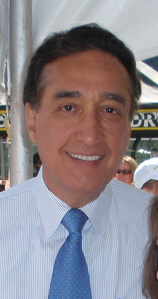Henry Cisneros, Mortality And The Pursuit Of Dreams
 By Tony Castro, Voxxi
By Tony Castro, Voxxi
Henry and I grew up at the same time in Texas in the 1960s, each of us attending Catholic schools in our respective hometowns and sometimes competing against each other in interscholastic league speech and drama contests.
The only time my father attended one of those competitions, he saw Henry deliver an interpretation of one of Abraham Lincoln’s addresses — the one appealing to the better angels within us — while I did two soliloquies from Hamlet using a Welsh accent I nailed from listening to a recording of Richard Burton.
My father was blown away — by Henry’s performance.
When he learned Henry was going to Texas A&M, my father asked me to reconsider my choice of colleges. In the 1950s and 1960s, A&M was the place all Mexican-American military veterans wanted their sons to attend — the school where they could join the corps, graduate as second lieutenants and serve their country as officers.
“Dad, Henry’s the son of a general,” I said, lying. I had no idea what Henry’s father did. “He’ll be an officer. Heck, he’ll probably be president one day. I’m the son of an enlisted man. I can’t lead men on a football team, much less on a battlefield. I’m a rebel and an outlaw. You said so yourself.”
My father had once said writers were all rebels and outlaws, and I wasn’t about to let him forget it.
All this came back to me as I read about Henry having prostate cancer. I pray and hope he’ll beat it. But what the news about Henry did was shake my foundation of well-being and forced me, for the first time, to seriously confront the mortality not only of someone so close to my dreams as a youth but also of myself as well.
Over the years, Henry’s life and mine have passed each other in Texas, Washington, Los Angeles and anywhere there were political conventions of any significance. I’ve interviewed Henry numerous times and, in our own ways, we’ve praised each other on our successes as well as consoled one another on our falls from grace, personally and professionally.
People who grow up as kids invariably have nicknames for each other, monikers that we use behind their backs. I don’t know what Henry’s was for me — I’ve heard them all from other friends and I imagine it might be something similar. Mine for Henry was Manolete, the Spanish bullfighter who rose to glory in the years after the Spanish Civil War.
I called him Manolete because I have never seen a picture of Manolete smiling. He always seemed so serious, almost sorrowful and tragic. Henry struck me that way, even when he was smiling, as if something very sad was going on in his life. I’ve never thought of myself as a playboy, but, in contrast, you would have thought I was the life of the party.
“Henry, it’s only words,” I recall saying to him after a debate tournament. His team hadn’t won, but neither had mine. Henry, though, wore that game face, as if blaming himself or as if he were facing a firing squad or some fierce 2,000-pound animal in a bullring. “You’re a great debater. You’ll win the next tournament.”
I think we all sensed that Henry was destined for true greatness, if anyone we knew ever was.
He became mayor of San Antonio and the rising Latino star of the Democratic Party. In 1984, Democratic Presidential Nominee Walter Mondale considered Henry as a running mate before choosing Rep. Geraldine Ferraro. In 1992, President Bill Clinton named Henry to his Cabinet. But we all have our secrets, and Henry’s doomed him. He was found to have lied to the FBI about a mistress, hush payments to her and a sordid affair that destroyed his dreams.
My father kept up with news reports of the investigation as if… well, as if Henry were his son. My father learned Henry had been betrayed by a journalist to whom he had confided about his affair, and you would have thought I was that writer who ratted him out.
“You work in a profession full of s— of b—— and Judases,” my father said to me at the time.
“And rebels and outlaws,” I reminded him.
A few years later, as my father lay on his deathbed, I wasn’t sure what else to say. We had made our peace, what we could anyway. I just wanted to say something more that would ease his final hours.
“Dad,” I said. “I’m sorry I wasn’t more like Henry Cisneros. I’m sorry I couldn’t fulfill your dreams. If it’s any consolation, I haven’t fulfilled my dreams either.”
My father shook his head, as if to protest. He had tears in his eyes, and I thought we would just sit there for a while longer.
“I don’t care about Henry,” he said, finally. “I care about you and what you did or tried to do. A father’s dreams for his son are never fulfilled. They’re just that — dreams. The important thing, and what I’m proud of you for, is that you had the courage to chase your own dreams. Your dreams — not someone else’s.”
This article first appeared in Voxxi.
Los Angeles-based writer Tony Castro is the author of the critically-acclaimed “Chicano Power: The Emergence of Mexican America” (E. P. Dutton, 1974) and the best-selling “Mickey Mantle: America’s Prodigal Son” (Brassey’s, 2002). His rite of passage memoir, “The Prince of South Waco: Images and Illusions of a Youth,” will be published in 2013.
[Photo by ChiMoose]
